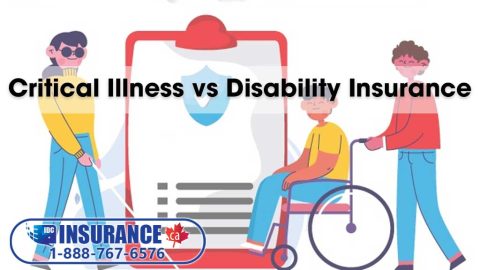Critical illness insurance acts as a financial cushion
Whereas life insurance has been readily available for literally hundreds of years, critical illness insurance is a relatively recent development. This type of insurance product came about in response to the rising need for protection if and when the insured suffered a severe illness. The policy claim is paid to the insured, and the proceeds are often used for seeking treatment and maintaining a comfortable lifestyle. Critical illness insurance also acts as a financial cushion to protect your family from a sudden loss of income. The sum from the insurance payouts can also cover other costs such as funeral arrangements, etc.
A wide range of insurance companies offer critical illness coverage, and you can even get online quotes by providing some basic information about yourself. If you are looking for the best critical illness insurance in Canada, you’ve come to the right place.
Out of 100 women
Out of 100 men
Critical illness insurance covered conditions
The terms and conditions will vary from company to company. As not all critical illness policies are the same, it is crucial to seek professional advice and guidance in choosing your policy. With our advisors’ help, you can easily pick out Canada’s best critical illness insurance quotes.
The terms and conditions will vary from company to company, but the following illnesses are insurable by virtually all insurers.
-
Heart Attack
-
Stroke
-
Breast Cancer
-
Prostate Cancer
-
Other Life-Threatening Cancer
-
Coronary Bypass Surgery
In addition to the basic coverage, the following are insured conditions, depending on which insurance company is chosen.
-
Multiple Sclerosis
-
Kidney Failure
-
Major Organ Transplant
-
Aorta Graft Surgery
-
Benign Brain Tumour
-
Coma
-
Heart Valve Surgery
-
Pre-Senile Dementia (Alzheimer’s)
-
HIV Assault with Needle
-
Loss of Independent Existence
-
Loss of Speech
-
Parkinson’s Disease
-
Paralysis/Paraplegia
-
Severe Burns
-
Balloon Angioplasty
-
Blindness in Both Eyes
-
Coronary Artery Disease
-
HIV through Blood Transfusion
-
HIV Medical Profession
-
Loss of Hearing
-
Loss of Limb
-
Motor Neuron Disease
It just makes financial sense to have the protection
Almost everyone has a family member, a relative, a friend or a co-worker who has suffered from a significant, possibly fatal illness. It is a sad truth and an unavoidable series of events in people’s lives. The reality is, when these life-threatening events do occur, it’s good to know that you have put the protection in place for yourself and your family. The following are statistics collected from various organizations that are driving awareness for finding the cure. The numbers speak for themselves.
- 1 in 4 Canadians will contract some form of heart disease 75,000 Canadians suffer heart attacks each year
- Heart disease costs the Canadian economy approximately $19 billion every year in medical services, hospitalization expenses, loss of income and loss of productivity
- The rate of death among patients hospitalized for heart attacks has been decreased by half, from 16 per cent to 8 per cent
- 1 in 2 heart attack victims are under the age of 65
Source: Heart and Stroke Foundation
- 50,000 Canadians suffer a stroke each year
- 75% survive the initial event
- Strokes are the leading cause of neurological disability
- 1/3 of stroke victims are under the age of 65
- 60% of stroke victims will be left with a disability
Source: Heart and Stroke Foundation
- More than 130,000 Canadians will be diagnosed with cancer this year
- Over 60,000 people in Canada will die this year from the disease
- 1 in 3 Canadians will develop cancer in their lifetime
- 1 in 9 women will develop breast cancer
- 1 in 3 women and 1 in 2.5 men will develop cancer in their lifetime
Source: Canadian Cancer Society
- Bypass surgery is performed more on men than women by a ratio of nearly 4 to 1
- There are approximately 11,000 bypass surgeries performed in Canada each year
- The rate at which bypass surgery is performed on people age 65 and older has increased
Source: Heart and Stroke Foundation of Ontario/Canada
- More than 50,000 Canadians have Multiple Sclerosis (MS)
- MS is the most common neurological disease among young Canadians
- Canadians have one of the highest rates of MS in the world
- Women are twice as likely to develop MS as men
Source: Multiple Sclerosis Society of Canada
- 30% of all Parkinson’s patients are under 50
- 20% of all Parkinson’s patients are under 40
- There are approximately 80,000 – 100,000 Canadians suffering from Parkinson’s
Source: Parkinson’s Foundation of Canada
- There is an estimated 900 Canadians who sustain a spinal cord injury each year
- More than 30,000 Canadians suffer from paralysis of 2 or more limbs
- Most persons who suffer spinal cord injury are between 16 and 30 years of age
- The most common causes of spinal cord injury are car collisions and falls
Source: National Spinal Cord Injury Association of Canada
- Alzheimer Disease is the fourth leading cause of death in Canada
- Every year approximately 10,000 Canadians die from Alzheimer’s
- Approximately 1 in 100 Canadians suffer from Alzheimer’s disease
- There are approximately 22,000 people in Metro Toronto with Alzheimer’s
- The disease occurs in 8% of the general population over 60
Source: Canadian Alzheimer Society
- Kidney disease ranks sixth among diseases causing death in Canada
- Each day an average of 8 Canadians learn that their kidneys have failed
- Approximately 2000 Canadians are on a waiting list for kidney transplant
- 351 kidney transplants were performed in Ontario in 1995
- 1 in 10 will develop kidney stones at some point in their lives
Source: Kidney Foundation of Canada
- 280,000 Canadians are deaf
- 1,120,000 Canadians are hard of hearing
- 1,400,000 do not use amplification
- There are more than 2,800,000 Canadians with hearing loss
Source: Canadian Hearing Society
- Approximately 4.4 million health care workers suffer 800,000 needle sticks and other injuries from sharp objects annually
- An estimated 16,000 of these objects are contaminated with HIV
Source: Canadian AIDS Society
How to choose the best policy for yourself?
Lump-sum payment
This is the traditional type of critical illness insurance, where one typically gets a lump sum payment 30 days after the diagnosis of a covered illness. These funds can then be used to pay for treatment outside the country or any other purpose you choose
Lump-sum payment and $1 million for medical treatment
One company now offers the traditional critical illness insurance at competitive rates plus a rider you can purchase, which covers the $1 million if you and the doctors feel you would benefit by going outside the country for treatment.
Return of premium
Upon death, most policies will return all premiums to your beneficiary as part of the policy – no additional charge, while others charge for this option as a rider.
Payback of the premium rider
Many policies offer this option on policies with a level premium to age 65, 70 or 75. For an extra premium, if you do not have a claim, you will get all your premiums back at the policy ending at age 65, 70 or 75, depending on the insurance company and policy purchased.
Children’s rider
Coverage is offered to children ages 2-17 and, in some cases, for children you have in the future, starting at birth. It will pay a lump sum. Usually, $25,000 on the diagnosis of a critical illness and the one premium frequently covers all children in the family.
Ten-year renewable term
Similar to ten-year renewable term life insurance. Rates are guaranteed in the policy, but they increase every ten years until the policy ends at age 65, 70 or 75. Generally applicable if the need is limited to 15 years or less. One use is to provide cash to complete a retirement plan should the insured become ill.
Level to age 65, 70, 75
The policy lasts to the age given, and the premiums remain the same throughout. It is one area of concern. The greatest likelihood of a claim is between 65 and 75, so the longer-term policies will cost a little more but could be worth the extra cost. It is an important consideration.
Permanent or to age 100
These are designed to last a lifetime, so the chances of collecting are high; hence so is the premium. Also, be careful that at age 100, the policy is still in place. While this has some uses, if money is short, one should look at getting the coverage to age 75.
We offer the lowest quotes for critical illness insurance
Canadians can now receive financial protection during the emotional time of a diagnosis of a life-threatening illness, such as cancer, heart attack, stroke or temporary disability if caused by a covered illness. You can get expert advice from IDC Insurance when comparing critical illness insurance quotes and plans available in Canada. But first, take a moment and provide some basic information for a quote. One of our certified critical illness insurance advisors will contact you, usually, the same day, if not, the following business day, to provide you with your free quotes accurately – without any obligations to buy.











